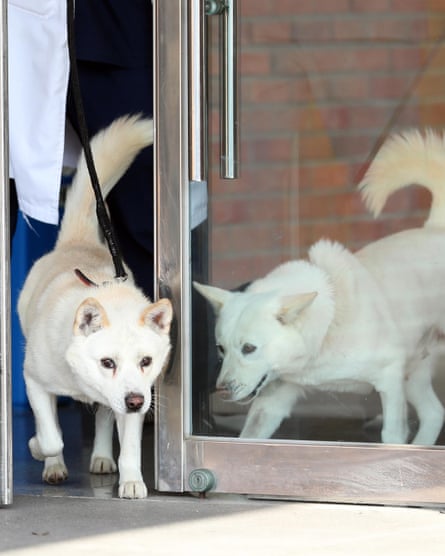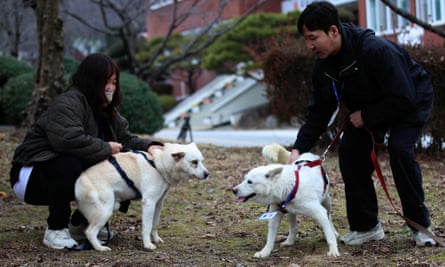A pair of dogs donated by North Korean leader Kim Jong-un four years ago ended up in a South Korean zoo after a dispute over who should pay for the animals’ care.
Kim had given the two Pungsan white hunting dogs – a breed originally from North Korea – to then South Korean president, Moon Jae-in, after talks at the Pyongyang summit in 2018.
But Moon gave up on the dogs last month, citing a lack of financial support for the dogs from the Conservative government led by Yoon Suk Yeol.

The dogs, named Gomi and Songgang, were moved to a zoo run by local officials in the southern city of Gwangju after a temporary stay at a veterinary hospital in the southeastern city of Daeju, zoo officials said.
With Gwangju Mayor Kang Gijung in attendance, the dogs were displayed on Monday with their tags around their necks as reporters and other visitors took pictures.
“Gomi and Songgang are a symbol of peace and South-North Korean reconciliation and cooperation. We will raise them as well as we cultivate a seed for peace,” Kang said, according to his office.
The dogs have six children between them, all born after their arrival in South Korea. One of them, named Byeol, has been raised in Gwangju Zoo since 2019. The other five are in other zoos and a public facility in South Korea.
Gwangju Zoo officials have said they will try to raise Byeol and his parents together, although they are kept apart because they do not recognize each other.
Gomi and Songgang are officially state-owned, and while in office Moon raised them in the presidential residence. After leaving office in May, Moon was able to take them to his private home due to a law change that allowed presidential gifts to be handled outside the presidential archives whether they were animals or plants.
But in early November, Moon’s office accused Yoon’s government of refusing to cover the costs of food and veterinary care for the dogs. Yoon’s office denied the allegation, saying it never stopped Moon from keeping the animals and that discussions about providing financial support were continuing.

Moon, a proponent of rapprochement with North Korea, has been credited with organizing now-dormant diplomacy over North Korea’s nuclear program, but has also faced criticism that his engagement policy has allowed Kim to buy time and increase his country’s nuclear capability in the face of international sanctions. Yoon accused Moon’s engagement policy of “subservience” to North Korea.
In 2000, Kim’s late father, Kim Jong-il, gifted another pair of Pungsan dogs to then South Korean president, Kim Dae-jung, after a meeting in Pyongyang, the first inter-Korean summit since their split in 1948. Kim Dae -jung, a liberal, gave Kim Jong-il two Jindo dogs, a breed that originated on an island in South Korea. The North Korean dogs lived in a public zoo near Seoul before he died in 2013.